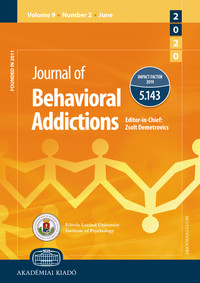Identifying individuals in need of help for their uncontrolled gaming: A narrative review of concerns and comments regarding gaming disorder diagnostic criteria
Identifying individuals in need of help for their uncontrolled gaming: A narrative review of concerns and comments regarding gaming disorder diagnostic criteria
Author(s): Chih-Hung Ko, Orsolya Király, Zsolt Demetrovics, Ju-Yu YenSubject(s): Behaviorism
Published by: Akadémiai Kiadó
Keywords: DSM-5; ICD-11; Internet Gaming Disorder; Gaming Disorder; validity; criteria
Summary/Abstract: Objective. In 2013, the Diagnostic and Statistical Manual of Mental Disorders, Fifth Edition (DSM-5) included the diagnostic criteria of Internet gaming disorder (IGD). Then, in 2019, the 11th Revision of the International Classification of Diseases (ICD-11) categorized gaming disorder (GD) as an addictive disorder. This review aimed to review the raised concerns, debate, and research of IGD or GD criteria and provide suggestions to resolve them. Methods. A narrative review was conducted, and PubMed was searched for articles mentioning concerns and research on the DSM-5 criteria for IGD, ICD-11 criteria for GD, or criteria for other synonyms, such as problematic gaming or gaming addiction. A total of 107 articles were identified. Results. Concerns were organized into three categories: conceptual framework, moral panic, and diagnostic validity. Most argumentations supported the proposition that GD and other substance use disorders have similar presentations. A clear definition of GD and adequate public education could prevent rather than exacerbate moral panic. Several researchers reported concerns regarding the nosology, diagnostic validity, and wording of each criterion. However, the threshold, five of the nine criteria with impaired function, demonstrated adequate validity in interview studies. Conclusion. The current findings support the addiction framework, functional impairment, and validity of the GD criteria. However, further prospective, experimental, and clinical studies validating these findings are warranted. Moreover, an integrative review or debate conference could contribute to the organization of the available results and concept development. Aggregating adequate scientific information could allay or resolve concerns related to the diagnosis of GD.
Journal: Journal of Behavioral Addictions
- Issue Year: 9/2020
- Issue No: 3
- Page Range: 572-588
- Page Count: 17
- Language: English

